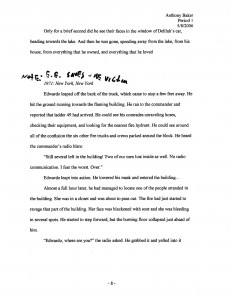When we are little, monsters are scary and evil and very real. As we get older, our monsters aren’t necessarily slimy creatures with eyeballs in the palms of their hands but are metaphors for other things that we fear: Will we get the job? Will we get into college? Will we be accepted by our peers? But when we’re young and monsters are still real, at least in our imaginations, we never think: What if they’re just misunderstood? What if the only reason they get themselves into trouble is because they lack a frontal cortex and the ability to develop a language to communicate effectively? We never question why monsters attack people, we just accept that is just the way it is. Would a monster truly be evil if he doesn’t intend to do anyone any harm? Legally speaking, was there intent to commit a crime? Should we condemn him to death and ostracize him from society? It seems as though dealing with monsters can bring up complex moral quandaries. The point is that maybe nothing is as clear-cut as it seems.
One of my favorite short stories was about monsters. I wrote it in seventh grade, a time when my passion for learning far exceeded my teachers’ passion for teaching. Assigned a two-page short story, I wrote an epic 20-page masterpiece titled “The Perfect Day.” I loved that story when I first wrote it, and I love it today but for entirely different reasons. First off, the story was called “The Perfect Day” but was in fact about a day in which everything goes wrong. A retired firefighter is having a peaceful day when suddenly a five-story tall, wormlike, “Brobdingnagian” sea monster erupts from the lake and begins wreaking havoc just as my protagonist was trying enjoy a nice barbeque. The firefighter is confronted with dramatic and haunting flashbacks to the time his best friend died in a fire, which ultimately gives him the strength to confront the sea monster and protect his grandchildren. Although he defeats the monster in the end, it would not under any circumstances be considered a “Perfect Day.” My favorite scene is early on in the story, where I foreshadow the events to come. The main character wakes up because a bird flew into his window and killed itself. He couldn’t go back to sleep because the sun was shining through the blood on the window and it cast him in a red glow. Subtlety was not my strength.
A Few Thoughts on Metaphor The Lakehouse The Particle-Wave Duality Meditation
David Foster Wallace First Grade The Last Frontier of Creativity
